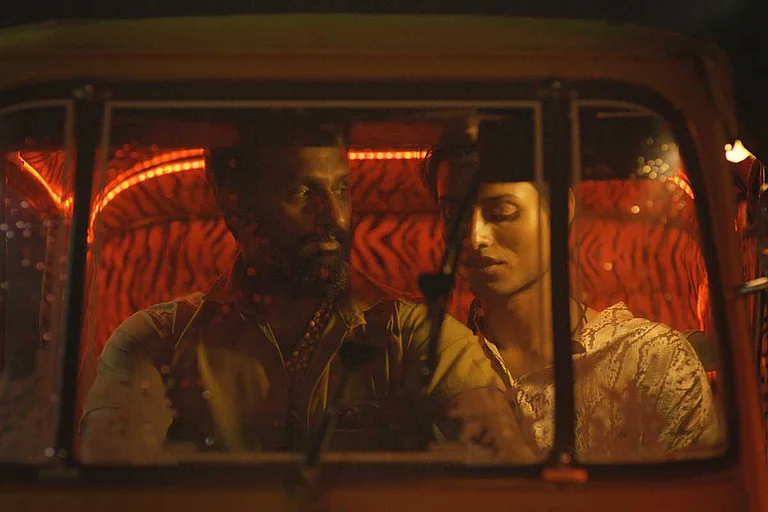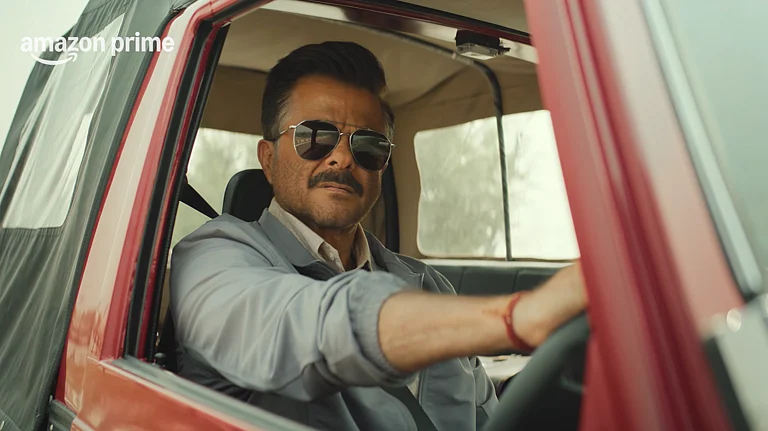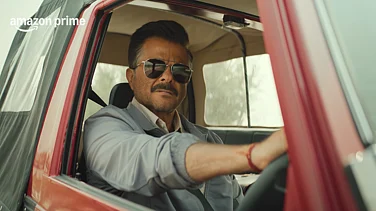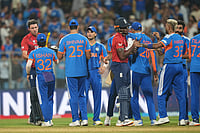
Summary of this article
Grand Ciel features in the Orizzonti Section at the 82nd Venice Film Festival.
It shows how migrant workers’ lives are written off as expendable in the “free market.”
The film insists that legal categories like “illegal immigrant” function as death sentences.
Akihiro Hata’s Grand Ciel (The Site) opens in darkness in the literal gloom of a half-built construction site, humming with migrant labourers welding, lifting, and drilling long after the rest of the city has gone to sleep. Their neon vests and safety helmets flicker against the fluorescent lights, while their conversations slip between Arabic, French, and Romanian.
The first scene of the film has the workers’ anxieties about safety vanish into managerial shrugs. From this uneasy beginning, Hata crafts a slow-burning thriller with supernatural/sci-fi elements that feels less like an exercise in speculative cinema than a mirror held up to Europe’s present. This is a commentary on the quiet brutality of capitalism’s dispassionate machinery, of disappearing worker rights, and the cost of countless human lives caught in the loop.
Grand Ciel tells its story through Vincent (Damien Bonnard)—one of the few white Frenchmen willing to endure the night shift. For this, he is quickly rewarded in a workplace structured around hierarchies of race and class. His colleagues urge him to join their informal attempts at solidarity, since unions do not fight for temp workers like them. But Vincent does not want to dream of rebellion. What motivates him is not collective resistance, but the fantasy of one day affording the very gleaming gated community he is helping construct, replete with its manicured greenery, views for miles, and no trace of the men who built it.
This is not just Vincent’s delusion. The thought that he might ascend the class ladder if only he keeps his head down belongs to us all. It mirrors the cruel optimism dangled before us, as we chug on with our lives; heads down, shoulders slumped, churning out labour that profits those who oppress us.
This dream curdles into a nightmare after Ousmane (Issaka Sawadogo), an undocumented labourer from Mali, goes missing. His absence, initially brushed off as desertion, sparks growing unease. Soon, there are more disappearances. The company’s response is predictably cruel. Those who dare to hold them accountable are swiftly dismissed. Despite Vincent’s moral dilemmas, his advancement at work comes tethered to class betrayal. Vincent finds himself increasingly distrusted by those around him, burdened by responsibility to his superiors, and cornered by obligations to his partner Nour (Mouna Soualem) and her son.
Hata and co-writer Jérémie Dubois lace this tale of the ordinary with hints of the uncanny. While scouring the crumbling understructures of the site, Vincent glimpses what appears to be one of his co-worker’s bodies dissolving into a storm of toxic dust. Is this an accident, a hallucination, or something more sinister? Engineers insist the air quality is normal. Yet the ominous dust storms recur. The horror elements here are not meant for jump scare spectacle, but to portray suffocating inevitability—the sense that the very ground beneath these men is engineered to erase them.
Grand Ciel is a story about how easily migrant workers’ lives are written off as expendable in the “free market.” The film insists that life under capitalism is cheap and legal categories like “illegal immigrant” function as death sentences. To live in a “clean city, green city,” someone else must pay the price. Somebody's utopia is another's dystopia.
Visually, Grand Ciel echoes Tarkovsky’s Stalker (1979) in parts. Cinematographer David Chizallet renders the construction site as both physical space and psychic landscape, full of terrors with its endless corridors stretching into darkness and strange dust storms that might be causing supernatural menace. The sparing score by Carla Pallone adds to this ambience of unease.
The performances anchor this vision. Bonnard plays Vincent with a quietly unravelling desperation, his stooped shoulders carrying the weight of compromise. Samir Guesmi imbues the rabble-rousing Saïd with a weary defiance. Mouna Soualem as Nour represents the struggle of the immigrant in a different walk of life. These characters ache and yearn for better lives, and it is what makes their fates so sordidly familiar and unbearable to witness at the same time.
By its close, Grand Ciel offers no escape. The site consumes its workers, the rest march on resigned to their fates. There are no uprisings, no whistle-blowing, no miracle waiting at the end. Instead, Hata leaves us staring at the machinery of progress—still humming, still indifferent. There is only the recognition that the “futuristic district” is not a utopia but a tomb. If anything, Hata’s film—a grim story about the horrors or perpetual, almost cancerous, progress—insists that we look down into the dust, that we acknowledge who disappears, so that others may ascend.
The main flaw lies in the film’s hesitancy to fully commit to its horror and sci-fi potential. The supernatural elements in Grand Ciel remain ambiguous, refracted through Vincent’s psyche. The film resists tipping into genre tropes; but this is also what holds it back. This restraint keeps the allegory grounded in realism. However, one can’t help but wonder what the film might have become, had Hata leaned harder into this promise. He chooses to leave us with something more muted and sombre and it works to an extent because the horrors of capitalism require no fictional monsters.
Debiparna Chakraborty is a film, TV, and culture critic dissecting media at the intersection of gender, politics, and power.




























